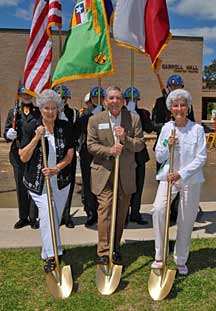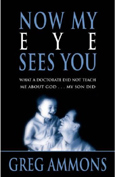Around the State
Posted: 6/22/07
| Officers of the Hispanic Baptist Convention of Texas were invited to the White House to take part in a Cinco de Mayo celebration held in the Rose Garden. They also took the opportunity to advocate passage of an immigration reform initiative. Pictured in the White House Rose Garden are Baldemar Borrego, president of the Hispanic Baptist Convention of Texas; Carlos Gutierrez, U.S. Secretary of Commerce; and Carlos Alfaro, an evangelical leader from Miami, Fla. |
Around the State
• San Marcos Baptist Academy has received a $500,000 donation to fund a new sports and fitness center. The gift, made by Don and Nancy Mafrige, both 1955 graduates of the academy, is the largest ever given by alumni.
• Houston Baptist University has announced the creation of the Elsa Jean and Don Looser Endowed Scholarship. Looser, who has announced his retirement as vice president of academic affairs, has served the university more than 44 years. His wife also served as a faculty member for three years.
 |
| San Marcos Baptist Academy has broken ground on an alumni plaza in preparation for the school’s 100-year anniversary in the fall. The alumni plaza will feature items that were part of the original campus. San Marcos Academy was located on Academy Street in San Marcos from its founding in 1907 until it moved to its present location on Ranch Road 12 in 1982. Several lamp posts, a central fountain and bricks from the downtown campus will be used to construct a memorial garden plaza outside the entrance to the school’s Carroll Hall. Construction of the plaza has been funded by Mary Nelle Payne Grusendorf, SMA class of 1948, and Nancy Payne Willingham, SMA class of 1950. Participating in the groundbreaking were Grusendorf, SMA Vice President for Development Bobby DuPree and Willingham. (San Marcos Baptist Academy/Photo by Don Anders) |
• Seventeen Dallas Baptist University students explored educational developments and leadership trends in South Korea earlier this month as a part of the school’s new doctor of education in educational leadership program. The students and their faculty sponsors partnered with local education leaders and visited a variety of K-12 schools and universities. Future trips abroad are being planned in conjunction with the program. For more information, call (214) 333-5484.
• Each summer, undergraduate and graduate students serve across the country and around the world working alongside Cooperative Baptist Fellowship Global Missions field personnel and Fellowship partners. Mary Beth Cooper of Gainesville, working with immigrants in Fredricksburg, Va.; Ashley Gatta of Round Rock, serving with Touching Miami with Love in Florida; Mary Beth Gilbert of Dallas, teaching English as a second language in Macedonia; Matt McGee of Arlington, serving in Southeast Asia; and Bethany Williams of Rising Star, who is serving as a service volunteer in Southeast Asia are among the more than 30 students taking part this summer.
• Robert Sartain, professor and chair of the department of mathematics at Howard Payne University, was named the school’s outstanding faculty member. Charles Barr, university grounds supervisor, was the recipient of the outstanding staff member award. Excellence in teaching awards were presented to Athena Bean, John Ferguson, Gary Gramling, Jason Lively and Julie Welker. Excellence in service awards were presented to Randy Weehunt and Glenda Huff.
• The board of trustees of the University of Mary Hardin-Baylor has approved Edna Bridges and J.A. Reynolds for designation as faculty emeritus. Bridges was a professor of education at the school from 1967 to 1993, and Reynolds served as professor of Christian studies from 1962 until 1999.
• Martha Cross, director of development at Wayland Baptist University the past six years, has been named executive director of institutional advancement at Wayland. She is a member of First Church in Plainview.
Anniversaries
• Ecclesia Community Church in Waco, fifth, June 17. Tony Stang is pastor.
• First Church in Sunrise Beach, 40th, June 23. A time capsule burial and memorial stone gathering were part of the commemoration. Bruce Clifton is pastor.
• First Church in Poolville, 130th, July 15. An afternoon of fellowship, food and reunion will follow the morning service. Former Pastor Tommy Galik, now Life Stage Pastor No. 2 at First Church in Weatherford, will preach. Christopher Keefer is pastor.
• Ciro Garcia, 45th as pastor of Iglesia Betania in Austin, July 15. He will celebrate his 85th birthday the same day. The celebration will begin at 3 p.m. Special messages can be sent to the church at 1117 Tillery Street, Austin 78702.
• Joel Thielepape, 60th in ministry, July 21. A come-and-go reception will be held in his honor from 2 p.m. to 4 p.m. at Woodlawn Church in Austin, where he served as interim pastor and now attends.
Retiring
• Armo Bentley, as pastor of Tolar Church in Tolar, July 1. He has been pastor of the church 12 years and in ministry 33 years. He also has been pastor of Southside Church in Winters, East Cisco Church in Cisco, First Church in Rising Star, Second Church in Vernon and North Cleburne Church in Cleburne. He and his wife, Juanita, plan to spend the warmer months near children who live in Oregon, and winter months in Cleburne, where they also have children.
Deaths
• Linwood Peterson, 86, May 25 in Chesapeake, Va. A graduate of Southwestern Seminary, he was pastor of First churches in Ben Franklin, Enloe, Leander and Rockdale, and Immanuel Church in Temple. He also was pastor of churches in North Carolina and Virginia. He was preceded in death by his son, David; brother, H.O. Jr., and sisters, Lois Sanders and Ismae Brinson. He is survived by his wife of 62 years, Mary Margaret; daughters, Donna Peterson and Paula Groover; son, Dale; sisters, Bernice Croom, Elsie Peterson and Mary Lennon; two grandchildren; and five great-grandchildren.
• Gerald Doyle, 80, May 25 in Kerrville. He was baptized at First Church in Vernon in 1941, and in 1946 committed his life to Christian ministry. He was a graduate of Hardin-Simmons University and Southwestern Seminary. In 1959, he and his wife, Mauriece, were appointed by the Southern Baptist Convention Foreign Mission Board to serve in Ecuador. They served in the cities of Quito, Manta, Guayaquil and Cuenca, where they helped start 33 churches before retiring in 1993, when they returned to Texas. He was a member of Sunrise Church in Kerrville. He is survived by his wife; sons, Chad and Eric; daughters, Marla Fuller and Renda Ziegler; brother, Joe; and sister, Juquita Hall.
• Bonnie Mae Moore, 92, June 2 in Columbus, Ga. She was a Southern Baptist missionary 33 years in Nigeria. She became fluent in the Hausa language and wrote a Bible commentary in that language. She was preceded in death by her brother, Milton.
• Lynne Cox, 55, June 5 in New Boston. She was the wife of Ken Cox, pastor of First Church in New Boston. She served the church as pianist and organist. She also sang in the church choir, sang solos and led the music for Vacation Bible School each year. She composed music and performed the compositions with ensembles at Texas Komen Race for the Cure events. She is survived by her husband; sons, Brooks and Casey; daughters, Amanda, Rachel and Clara Cox; and twin sister, Lane McFarland.
• Bill Tanner, 77, June 10 in Belton. He was a former president of the University of Mary Hardin-Baylor, serving the school from 1968 until 1971. A Baylor University graduate, he distinguished himself as a preacher during the youth revival movement. He held a master’s degree and a doctorate from the University of Houston and also a doctorate from Southwestern Seminary. He was pastor of West End Church in Houston, Field Street Church in Cleburne, Broadway Church in Houston, and First Church in Gulfport, Miss., before taking over the reins as the head of the Belton school. During his tenure as UMHB president, the school went from being all-female to fully co-educational. He left UMHB to become president of Oklahoma Baptist University and stayed there until 1976, when he became president of the Southern Baptist Convention’s Home Mission Board. During his 10 years of leadership there, 5,480 new missionaries were appointed to serve across the country. In 1986, he returned to Oklahoma to serve as executive director and treasurer of the Baptist General Convention of Oklahoma. He retired in 1996. He was preceded in death by his son, Mark, and grandson Geoffrey Tanner. He is survived by his wife of 55 years, Ellen; sons, William Jr. and Keith; daughter, Kimberly Salter; and 10 grandchildren.
Events
• The Telestials of Hendersonville, Tenn., will perform in concert at 7 p.m. June 29 at Mount Calvary Church on Highway 105, halfway between Moss Hill and Batson. For more information, call (936) 298-2966. Carlton Bailey is pastor.
• The Double Portion Band will perform July 4 at 4 p.m. at First Church in Sunnyvale. Charles Wilson is pastor.
News of religion, faith, missions, Bible study and Christian ministry among Baptist churches, in Texas, the BGCT, the nation and around the world.



